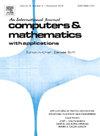斯托克斯界面问题的不符扩展虚拟元素法
IF 2.9
2区 数学
Q1 MATHEMATICS, APPLIED
引用次数: 0
摘要
本文提出了一种非拟合扩展虚元法,它将扩展有限元法与非拟合虚元法相结合,用于求解非拟合界面网格的斯托克斯界面问题。通过引入一些稳定项和惩罚项,以及离散双线性形式中定义在界面元素非切边上的一些特殊项,我们证明了离散 inf-sup 条件,并获得了最优误差估计值。结果表明,所有结果不仅与网格大小和粘度系数无关,而且与界面位置无关。我们进行了数值实验来验证理论结果。本文章由计算机程序翻译,如有差异,请以英文原文为准。
A nonconforming extended virtual element method for Stokes interface problems
In this paper, we propose a nonconforming extended virtual element method, which combines the extended finite element method with the nonconforming virtual element method, for solving Stokes interface problems with the unfitted-interface mesh. By introducing some stabilization terms and penalty terms, as well as some special terms defined on non-cut edges of interface elements in the discrete bilinear form, we prove the discrete inf-sup condition and obtain optimal error estimates. It is shown that all results are not only independent of the mesh size and the viscosity coefficient, but also the interface position. Numerical experiments are performed to verify theoretical results.
求助全文
通过发布文献求助,成功后即可免费获取论文全文。
去求助
来源期刊

Computers & Mathematics with Applications
工程技术-计算机:跨学科应用
CiteScore
5.10
自引率
10.30%
发文量
396
审稿时长
9.9 weeks
期刊介绍:
Computers & Mathematics with Applications provides a medium of exchange for those engaged in fields contributing to building successful simulations for science and engineering using Partial Differential Equations (PDEs).
 求助内容:
求助内容: 应助结果提醒方式:
应助结果提醒方式:


